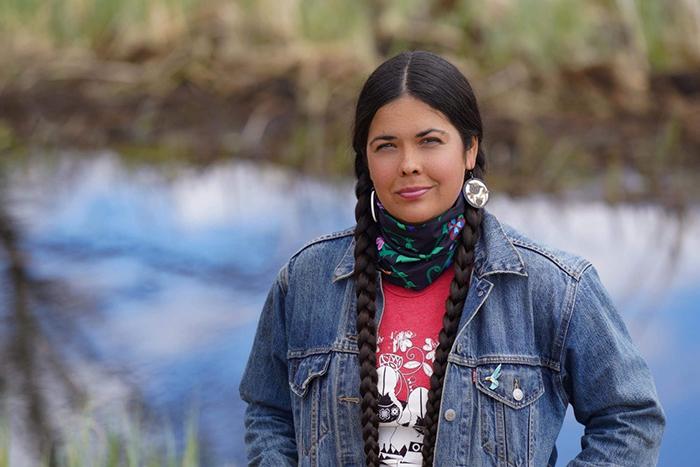Environmental and Indigenous Rights Advocate to Receive Dickinson’s Rose-Walters Prize for Environmental Activism

Tara Houska. Photo by Nedahness Greene.
Tara Houska is an Indigenous attorney and founder of the Giniw Collective
Tara Houska, a citizen of Couchiching First Nation and a devoted environmental and Indigenous rights advocate, will be presented with the Sam Rose ’58 and Julie Walters Prize for Global Environmental Activism at Dickinson College. The $100,000 prize is awarded annually to an individual or organization making a defining difference and advancing responsible action on behalf of the planet, its resources and people. Houska, who actively resisted the Line 3 oil pipeline and the Dakota Access pipeline, is heavily involved in the movement to defund fossil fuels. She will accept the recognition at Commencement on Sunday, May 21.
The Rose-Walters Prize honors Houska’s work as a tribal attorney, land defender and founder of the Giniw Collective, an Indigenous women and two-spirit-led resistance committed to defending the Sacred and advocating for systemic change that respects Indigenous sovereignty and natural law. Giniw prioritizes land defense, traditional knowledge and divestment to protect the Earth.
Houska grew up in the small, rural border town of Ranier, Minnesota, where Rainy Lake spills into the Rainy River directly across the shore from the Couchiching First Nation reserve in Ontario. After earning a B.A., a B.S. and a magna cum laude J.D. from the University of Minnesota, she began her work as a tribal attorney in Washington, D.C., clerking under the Obama administration and lawyering at a few firms. During Senator Bernie Sanders' 2016 presidential run, she stepped up as an advisor on Native affairs and was the lead author of his Native policy platform. As calls went out from Standing Rock Sioux Tribe to stand against the Dakota Access pipeline, Houska moved into full-time advocacy under a nonprofit. After moving home to protect her people’s territory from Line 3 pipeline, she founded the Giniw Collective.
In addition to her environmental advocacy, Houska is the co-founder of Not Your Mascots, a nonprofit promoting positive representation for Native Americans in the public sphere. She is a TED speaker and has written for the women’s climate anthology All We Can Save, The New York Times, CNN, Vogue and Indian Country Today. She is the recipient of the 2021 American Climate Leadership Award and the 2019 Rachel’s Network Catalyst Award.
During the 2023-24 academic year, Houska will visit Dickinson for a residency, meet with students, participate in a public event and visit classes. The Rose-Walters Prize has been awarded to a cross-section of individuals and institutions engaged in climate advocacy, including Pulitzer Prize-winning author Elizabeth Kolbert, award-winning actor and activist Mark Ruffalo, author and journalist Bill McKibben, former EPA administrator Lisa Jackson, the UN’s Intergovernmental Panel on Climate Change and Our Children’s Trust, the organization that represented 21 young plaintiffs in the landmark federal climate change lawsuit Juliana v. United States.
After spending years living off-grid in resistance camps fighting fossil fuel infrastructure, Houska sees a need for movement balance and is currently working on a long-term Land Back project on Rainy Lake. In January, she closed on Bald Rock Point, a nearly 100-year-old, 16-acre camp with cabins, docks and a main lodge. Houska and the Collective are restoring the camp to host those seeking to learn advocacy and land defense skills and traditional and cultural knowledge to foster healing and reconnection with nature—it is a reclamation of land, of a way of life and centers Indigenous leadership.
For Houska, the birth of her daughter crystallized her convictions about the urgency of protecting the planet. Houska invests her hopes in the evolving movement she is helping to lead, which has involved thousands of people on the ground in the last few years, and inspired hundreds of thousands of Indigenous and non-Indigenous peoples across the world to follow Native leadership. She believes in building a holistic and pragmatic movement, centering values that lead with natural law, humility and empathy and carrying our words into action.
TAKE THE NEXT STEPS
Published April 24, 2023